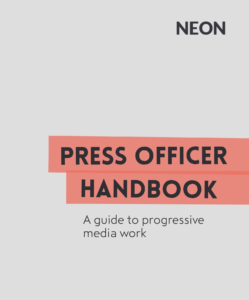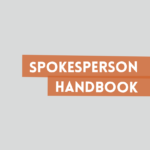Trainings

PRESS OFFICER HANDBOOK:
a guide to progressive media work
By Matthew Butcher, Polly Edwards from NEON
Download your free electronic copy!
PRESS OFFICER HANDBOOK: a guide to progressive media work
By Matthew Butcher, Polly Edwards from NEON
Being a press officer means different things to different people, but at its most basic it’s your job to help your cause or organisation communicate what you are doing for the world. You might be part of a communications team, or the only press officer in your organisation – or maybe you aren’t even being paid to do the press work. Whatever your exact role, you are reading this guide because you want to better understand how to get media coverage for a cause you care about.
It’s not always easy doing press work. On one side there are colleagues and allies desperate for coverage of the issues you are working on, and on the other side are overworked journalists receiving pitches hundreds of times a day from people just like you. You’re often the bearer of bad news (‘They aren’t interested in the story’ / ‘We don’t have anyone available at that time’). You won’t always be thanked when things go well, but you’ll likely get the blame if things go wrong. And when things go wrong, they can go very wrong.
On the plus side, what you do really matters. When you get coverage, you don’t just raise public consciousness, you might inspire people to take political action, donate their money or change their behaviour. Without your work there’s a good chance that no one outside of a very small bubble would ever hear about the work being done by your organisation. You are the microphone of the movement.
Contents
- Introduction
- What makes a good press officer
- What is framing and why is it important?
- Audiences
- What makes the news?
- Media strategies / Comms strategy
- Press release
- What is a press release?
- How to format a press release
- How to send a press release
- Diary notes
- Using the phone
- Building relationships with journalists
- Breaking into broadcast
- What do broadcasters want?
- How to pitch
- Freedom of information requests
- Different types of broadcast
- What makes a good spokesperson?
- How to prepare for a broadcast interview
- How to pitch and write comment pieces
- Pitching to comment desks
- Ghost-writing
- How to deal with rejection
- Regional and local media
- Why pay attention to local media?
- What is the media landscape regionally?
- Alternative forms of media
- Challenges: Hostile journalists, crises and mistakes
- Hostile journalists
- Dealing with a crisis
- Tools and tips
